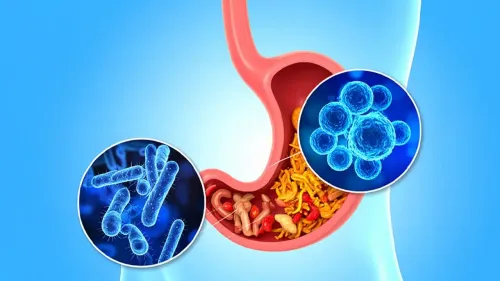Could Probiotics for Preterm Babies Reduce Antibiotic-Resistant Bacteria in the Gut?

Synopsis
Key Takeaways
- Probiotics can help preterm infants develop a healthier gut microbiome.
- Reducing multidrug-resistant bacteria is essential for infant health.
- Use of probiotics in NICUs can significantly impact neonatal health outcomes.
- The study supports recommendations from the WHO for probiotic supplementation.
- Understanding gut health in infants is crucial for combating AMR.
New Delhi, Aug 16 (NationPress) A recent study reveals that preterm infants with extremely low birth weight who were administered a probiotic alongside antibiotics exhibited lower levels of multidrug-resistant bacteria and a more balanced gut microbiome. This research, published in Nature Communications, involved a trial of 34 preterm infants born with a weight under 1,500g, which constitutes approximately 1-1.5 percent of global births.
Researchers from the University of Birmingham in the UK analyzed gut bacteria from these infants during their initial three weeks of life.
The findings indicated that infants receiving a specific strain of probiotics, such as Bifidobacterium, along with antibiotics, developed typical early-life gut microbiota levels akin to those of full-term infants.
This intervention led to a reduction in both the prevalence of antibiotic resistance genes and the number of multidrug-resistant bacteria present in their gut.
Additionally, there was a decrease in the levels of drug-resistant pathogens, notably Enterococcus, which are associated with increased infection risks and prolonged hospital stays.
Professor Lindsay Hall from the University of Birmingham stated, 'We have previously established that probiotics effectively safeguard at-risk preterm infants from severe infections. This study now demonstrates that these probiotics significantly diminish the presence of antibiotic resistance genes and multidrug-resistant bacteria in the infant gut.'
Infants treated with probiotics also showed elevated levels of beneficial bacteria naturally found in the gut.
In contrast, among those not given probiotics, the gut bacteria analysis revealed variations between those receiving antibiotics and those who did not; however, both groups developed a dominant microbiome featuring key bacteria (pathobionts) that could lead to health issues, including life-threatening infections during the critical post-birth period and beyond.
'In light of the global AMR crisis, this is a significant discovery, particularly for NICUs where preterm infants are particularly susceptible. Probiotics are now widely utilized in numerous neonatal ICUs across the UK, and the WHO has endorsed probiotic supplementation for preterm infants,' Hall remarked.
'Our paper illustrates how advantageous this intervention can be for prematurely born infants, aiding in the enhancement of their gut health and mitigating the effects of harmful pathogens,' she further added.
The research demonstrated that the probiotic Bifidobacterium proliferates rapidly in the preterm gut during the first three weeks of life, facilitating the maturation of gut microbiota. It is also associated with a significant decrease in multidrug-resistant pathogens, underscoring its critical role in promoting neonatal health.









